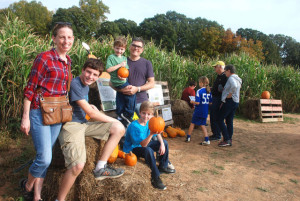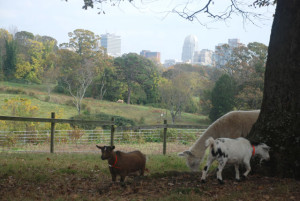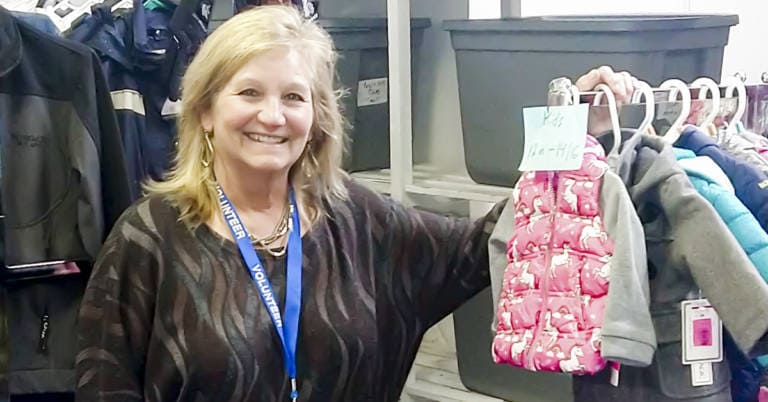When programmatic decisions and economic realities threatened to shut down The Children’s Home farm in 2014, community volunteers rallied to enlist an army to keep it operating.
Fowler Ruffin and Laura Gentry had been feeding animals at the farm for 10 years. They called other volunteers to a meeting in May at a local coffee shop. From that meeting arose a petition that eventually garnered 1,800 signatures, a business plan, a Facebook page and fund raising strategies. Planning evolved into weekly Tuesday meetings around pizza at Ruffin’s house.
“We really engaged the community,” said volunteer Leigh Summer.
Dan Gentry, Laura’s husband, a stock trader and accountant, started on the business plan. He enlisted Dick Vann, founder of PostMark mailing and printing service, to help with the plan and produce a brochure. Kate Duke, Marshay Privott and Tommy Priest joined the others in working the phones and their connections. The petition was set up so that each signature prompted an email to board chair Ted Teague and TCH’s executive director at the time.
In just a week volunteers met with Teague to present a “very rough plan” showing how the farm could become self supporting and demonstrating its importance to sustaining TCH.
After a presentation at the board’s next meeting Teague asked, “How do you tell 1,000 people in the community ‘No?’” and said the volunteers would be given a chance to keep the farm going, but the operation could not be a drain on The Children’s Home general budget.

The John and Danielle Fortunato family were among thousands that enjoyed the first The Farm Maze, a fund raising effort of farm business managers Kevin Bokeno and his daughter Shannon English.
Volunteers accepted the challenge. They found a donor for animal feed so the animals did not have to be adopted away. A grant from the Winston-Salem Foundation funded a farm business director, a job that is split between Kevin Bokeno and his daughter Shannon English. The John and Anna Hanes Foundation funded a farm manager, who is Mark Spicer.
Vann sees four stakeholders in any decision regarding the farm: The Children’s Home as an entity, the children it serves, the Methodist Church (which founded The Children’s Home in 1909), and the community.
”It’s inappropriate to compromise any of those four,” he said. “We’re looking for solutions so they all get the maximum benefit.”
For Laura Gentry, who leads a therapeutic program involving animals, the farm “is a part of our lives. It’s huge. We could see the difference the farm activities make in the kids, being outside, forgetting their troubles.”
Volunteers kept up the traditional strawberry growing and had a “spring fling” open house that drew thousands. Alumni and other friends rallied, including one friend who gave $20,000 toward farm expenses.
We could see the difference the farm activities make in the kids… – Laura Gentry

TCH farm animals graze virtually in the shadow of city towers.
The farm is unique in that its 212 acres sit in the middle of a metropolitan area. The community has a sentimental attachment ignited by seeing the cows grazing on the hill, which harkens back to childhood farms for many. They support the farm through produce purchases and attending special events.
Several volunteers who rallied to keep the farm operating are now on The Children’s Home board of directors, including Kate Duke.
“Being on the board has been eye opening, enabling me to get a different perspective, to understand the challenges the entire home is facing, not just the farm; and to understand the reasoning about why they were going to close it,” she said. “I’ve really enjoyed being involved in more aspects than just feeding on Wednesday and assuming everything was fine. And I’ve made a lot of great friends through it.”
Looking back, the farm closing threat has been “good in the long run,” said Ruffin, because it ignited an outpouring of community support.
“The community came to the farm to save it, and they did it,” she said. “We still need them. The kids need them more than ever.”
Farm activities include year round produce, agricultural education for area schools, equine therapy, Children’s Home residents working in the gardens and with animals, a successful maze that has drawn thousands, cutting in a separate road to the farm and establishing a Farmery at the end of the road where produce, honey and other products will be sold continually, and other dreams that include an event venue.
Volunteers are pleased with the progress, “but nobody is ready to sit down,” Ruffin said.
“The whole crux of the matter to me is to see a child learn and be empowered in their own capacity to make a difference in somebody else’s life,” said current board chair Katheryn Northington. “The bottom line is the healing process.”



